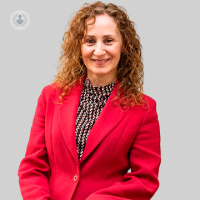Living with rosacea: a guide to a chronic condition
Written by:Rosacea is a common skin rash that affects millions of people in the UK. Chronic in nature, rosacea usually affects the face. More prevalent in middle-aged people, it is characterised by flushing, redness, swollen lumps, and pus. Somebody with rosacea may experience times when symptoms are more severe, and other times when symptoms are mild.
In this article below, highly experienced London-based consultant dermatologist, Dr Montse Gilaberte, outlines the main symptoms associated with the skin condition

What are the symptoms?
Rosacea symptoms usually begin with a period of flushing, when the skin reddens, before further symptoms present themselves as the rosacea progresses. These symptoms include:
- Stinging and burning
- Persistent red skin
- Spots
- Small blood vessels appearing in the skin
What causes rosacea?
Although the exact cause of rosacea is not known, there are certain risk factors that can increase somebody’s chance of developing it, such as abnormal blood vessels or some kind of a reaction to microscopic mites that reside in the face. Other possible triggers, although not necessarily direct causes, of rosacea include:
- Sunlight
- Stress
- Cold or hot weather
- Hot drinks
- Arduous exercise
- Alcohol
- Caffeine
- Some kinds of foods, such as spicy food
When should I see a doctor for rosacea?
If rosacea-like symptoms persist, it is a good idea to get in touch with your GP or a specialist. In most cases, a diagnosis can be made after an examination of the skin, with the patient answering a few questions about their rosacea symptoms and what might be triggering them. Sometimes, further tests may be necessary if it is not clear to the doctor that what the patient has is rosacea.
How is rosacea treated?
Rosacea is still an incurable condition, but thankfully it is possible to keep rosacea symptoms under control by following a long-term treatment plan. The most common forms of rosacea treatment include:
- Recognising and avoiding possible triggers (different for each individual)
- Special creams and gels to reduce swelling and redness
- Oral medication, such as certain pills, can help clear up severe rosacea symptoms
What is life like living with rosacea?
As with all chronic conditions, sometimes there can be a negative psychological effect as the sufferer feels disheartened and maybe even powerless to do anything about their condition. Low self-esteem is often a common consequence of any long-term condition such as rosacea.
As hard as it may seem at times, it is important to try and look on the bright side. The first step is accepting you have a long-term condition that is not curable but controllable. By sticking to treatment, it is possible to keep rosacea under control which can do wonders for self-confidence as the sufferer is able to face the world without embarrassment. There are millions of sufferers out there, and support groups are also available.
If you would like to make an appointment with Dr Montse Gilaberte today, just head on over to her Top Doctors profile.


